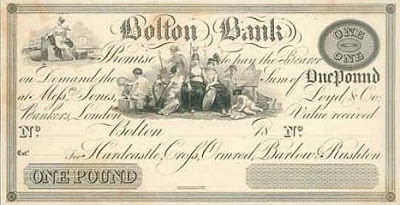Victorians Gettin' Around
Lady Bracknell suffers the supreme indignity of having to catch a luggage train in order to follow Gwendolyn following Jack. What's that all about?
According to the Oxford University Press, a 'luggage train' is just that: 'A train for transporting goods, not travellers.' Apparently no one saw fit to take pictures of the interior of compartments on luggage trains, or at least not post them online. (Grrr.) To ride a luggage train, options would probably include sitting on trunks or wooden crates in one of the compartments, or riding with the driver up in the engine car. (Probably illegal, but if anyone is going to bully their way into it it would be Lady B. The downside with the engine car is that it would be smoky, dirty, & loud - riding with the trunks is likelier.) Trains in the 1890's traveled around 30 miles an hour, so the luggage train would still have been relatively safe. And Hertfordshire is only about 20 miles north of London, so even at 30 miles an hour it would be a trip of less than an hour.
Victorian railways were quite busy, and tightly scheduled - passenger cars would depart regularly, with luggage trains for shipments and coal trains for, well, you know, scheduled in-between.
Codes of Conduct
According to the Oxford University Press, a 'luggage train' is just that: 'A train for transporting goods, not travellers.' Apparently no one saw fit to take pictures of the interior of compartments on luggage trains, or at least not post them online. (Grrr.) To ride a luggage train, options would probably include sitting on trunks or wooden crates in one of the compartments, or riding with the driver up in the engine car. (Probably illegal, but if anyone is going to bully their way into it it would be Lady B. The downside with the engine car is that it would be smoky, dirty, & loud - riding with the trunks is likelier.) Trains in the 1890's traveled around 30 miles an hour, so the luggage train would still have been relatively safe. And Hertfordshire is only about 20 miles north of London, so even at 30 miles an hour it would be a trip of less than an hour.
Victorian railways were quite busy, and tightly scheduled - passenger cars would depart regularly, with luggage trains for shipments and coal trains for, well, you know, scheduled in-between.
 |
| Houdini was 21 years old in 1895. It's POSSIBLE his show shared a luggage train with Lady Bracknell! |
* * * * *
Codes of Conduct
As with most social standards, Victorian behavior varied widely from the 'accepted' norms for interaction between men & women. The baseline stereotype indicated that men & women should never touch before marriage, with the exceptions being when a gentleman is offering a lady aid and during a dance (in which case both parties would have gloved hands). Ladies could flirt with a gentleman using a fan, and in the most formal of situations might take an arm held out in the mode of escort by laying her fingers upon it with the lightest of touches. This same stereotype also indicates that women of the period did not know anything about and did not enjoy sexual intercourse, while men regularly employed mistresses and prostitutes. The reality was that interpersonal relationships actually occupied a fairly wide behavioral range - Wilde's line from The Importance of Being Earnest re: 'In matters of grave importance, style, not sincerity, is the vital thing' (Gwendolyn) seems to be both an ironic commentary and a reflection of literal (not alternative) truth.
Once a couple became engaged,it was more acceptable to interact physically while walking, to sit closer together, or spend slightly longer periods of time unchaperoned behind closed doors. Actual levels of intimacy would have been determined by family/chaperone allowances and by personal inclination - at least as long as none of the 'high sticklers', who clung to the form as well as the intent of behavioral norms, were around to see.
Londoners and others living in large-cities held to the opinion that those living in the country held to more relaxed, less 'civilized' standards of behavior, and country dwellers often expressed the belief that living in a city was like stepping into a cesspool of depravity and illicit activities. Naturally, both sides were at least somewhat correct.
 |
| 'Ugh. GLOVES, please!' |
 |
| 'I suppose as long as this tree is here to chaperone us... *giggle*' |
 |
| SHOCKING. |
Here's a fun note - The Victorians did have a rule for kissing. This comes from America, though, so take it with a grain of salt.
KISSING: The gentleman must be taller than the lady he intends to kiss. Take her right hand in yours and draw her gently to you; press her to your bosom; at the same time she will throw her head back, and you have nothing to do but lean a little forward and press your lips to hers, and the thing is done.
Don’t make a noise over it as if you were firing off shooting crackers, nor pounce down upon it like a hungry hawk upon an innocent dove, but gently fold the damsel in your arms without smashing her standing collar or spoiling her spittles, or breaking her hoops, or treading on her toes, and by a sweet pressure upon her mouth, revel in the blissfulness of your situation, without smacking your lips over it as you would over a glass of lager beer.
–Excerpted from the Daily Times, Leavenworth, Kansas, 20 November 1863, p3, c2.



Comments
Post a Comment